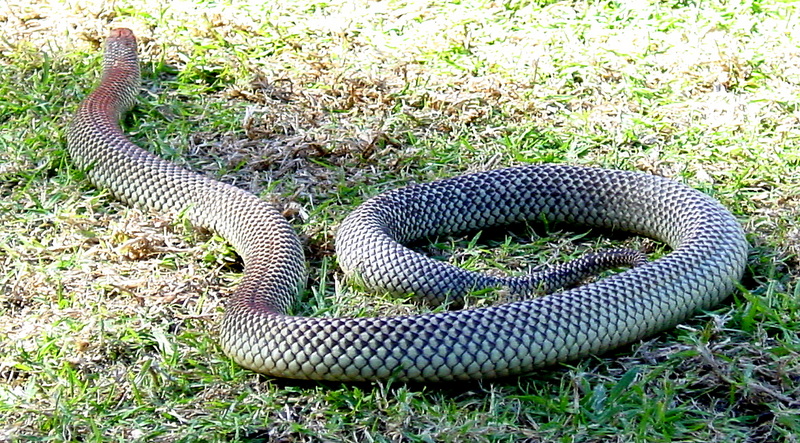|
| Query: Smooth snake | Result: 24th of 60 | |
King Brown Snake, Mulga (Pseudechis australis) - Wiki
| Subject: | King Brown Snake, Mulga (Pseudechis australis) - Wiki
| |

| Resolution: 1522x842
File Size: 851653 Bytes
Date: 2003:05:31 20:45:16
Camera: CYBERSHOT (SONY)
F number: f/2.0
Exposure: 10/3200 sec
Focal Length: 210/10
Upload Date: 2007:11:15 10:29:55
|
ERROR : Server Busy(-1105)
ERROR : Server Busy(-1105)
King Brown Snake, Mulga (Pseudechis australis) - Wiki
Pseudechis australis
From Wikipedia, the free encyclopedia
Order: Squamata
Suborder: Serpentes
Family: Elapidae
[Photo] Pseudechis australis, aka the King Brown Snake or Mulga Snake is a venomous snake found in Australia. It is the second largest venomous snake in Australia (after the Taipan) and produces large amounts of venom. Although the name implies it is a brown snake, it is in fact part of the black snake genus. Date May 31, 2003. Author F. Delventhal (http://www.flickr.com/people/13194817@N00) from Outside Washington, D.C., US
The King Brow or Mulga is a venomous snake found in Australia. It is the second largest venomous snake in Australia (after the Taipan) and the third largest venomous snake in the world and produces large amounts of venom. Although the name implies it is a brown snake, it is in fact part of the black snake genus.
Appearance
Mulga snakes are large venomous snakes growing from 2.5 metres to 3 metres in length. Depending on its areal extent, mulga snakes can be of a light brown colour in the desert to a dark brown-blackish colour in the cooler regions of Queensland, South Australia and New South Wales. Mulga snakes are robust with a wide head and smooth snout.
Range
Mulga snakes occur over much of Australia. They are found in every state of Australia except for Victoria and Tasmania. Its range includes all of the Northern Territory, most parts of Western Australia, Queensland, New South Wales and South Australia. It may also be found in the western parts of the Australian Capital Territory.
Habitat
Mulga snakes inhabit woodlands, hummock grassland, chenopod scrubland and almost bare gibber or sandy deserts sheltering under timber, rubbish piles, burrows and deep soil cracks. They are not found in rainforests.
Diet
The mulga snake primarily eats other reptiles, earning the title 'reptile eater'. It eats other snakes (including venomous species), lizards, birds, mammals and frogs. It is well adapted to eating other venomous snakes, with most venom having no or subtle effects. With giant venom glands, mulga snakes will bite and hold their prey using a chewing action to pump enough venom to slow up even the most deadly adversary.
Venom
Although being a potentially dangerous snake, its venom is not particularly toxic but it is produced in huge quantities. The average tiger snake produces around 10-20 mg when milked. By comparison, a good sized king brown may deliver over 150 mg in one bite.
Anti-Venom
King Brown Snake anti-venom is generally used to treat bites from this species, after a CSL Venom Detection Kit has returned a conclusive result for King brown snake envenomation.
Reproduction
Female mulga snakes produce a clutch of around 8-20 eggs, which may be laid in a disused burrow or beneath a log or rock. There is no maternal care for the eggs once they have been laid. Eggs take about 2-3 months to hatch, after which time the new born snakelets must care for themselves.
http://en.wikipedia.org/wiki/Pseudechis_australis
| The text in this page is based on the copyrighted Wikipedia article shown in above URL. It is used under the GNU Free Documentation License. You may redistribute it, verbatim or modified, providing that you comply with the terms of the GFDL. |
|
Comments |
|---|
| | Guest |
|
| it was so kool finding info bout thiz im like so using it for my school reseach :) |
| | mbbs_muthu |
|
| hai how are you |
^o^
Animal Pictures Archive for smart phones
^o^
|
|
|

